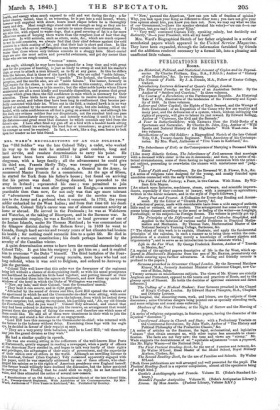MRS. WARD'S RECOLLECTIONS OF AN OLD SOLDIER. * Tns "Old Soldier"
was the late Colonel Tidy; a cadet, who worked his way up to the rank he attained by good conduct, long and bard service, and resolute determination to carry his point. He must have been born about 1775: his father was a country clergyman, with a large family ; all the advancement he could give his third son, Francis Skelly Tidy, was twenty guineas " to buy a sword," and the promise of a relation, a General in the Army, to recommend Master Francis for a commission. At the age of fifteen, be started for York from his father's house i • but found on arriving that his patron was dead. Nothing daunted, he proceeded to the army in Ireland ; represented his case ; was permitted to join as volunteer; and was soon after gazetted as Ensign,—a success more practicable then than now, for not only was that age more tolerant of "adventurers " than ours, but zeal for the service was then rare in the Army and a godsend when it occurred. In 1792, the young soldier embarked for the West Indies; and from that time till his death in Canada, Colonel Tidy's career was one of almost constant activity at home or abroad. He served in the Peninsula ; he was at Walcheren and Waterloo, at the taking of Bhurtpore, and in the Burmese war. In more peaceable employ, he was a Resident or local governor of one of the Ionian Islands, under Sir Thomas Maitland ; he was commandant of the Glasgow district during the Reform fever ; in 1833 he went to Canada, though hard service and twenty years of hot climates had broken his health ; for nothing could reconcile him to a quiet life. He died in 1835, of a worn-out constitution ; his death perhaps hastened by the severity of the Canadian winter.
A quiet determination seems to have been the essential characteristic of Colonel Tidy. It got him his ensigncy ; it got him on ; and it enabled him to overcome " the Duke " himself. The third battalion of the Four- teenth Regiment consisted of young recruits, mere boys who bad not long enlisted, when it was sent to Belgium, and ordered to Antwerp to join the garrison.
" Colonel Tidy well knew that this order was the forerunner of the regiment being left without a chance of distinguishing itself; so with his usual promptness and hardihood he collected his little band together, and putting himself at their head, he marched them into the square at Brussels, and drew them up under the windows of the hotel in which the Duke of Wellington was residing.
"'Now, my lads,' said their Colonel, beat the Grenadiers' march.'
" They beat it con amore, and in right good style.
"Attracted by the sound of drums and fifes, Lord Hill opened the windows of the apartment in which he and the Commander-in-chief were sitting, with some other officers of rank, and came out upon the balcony, from which he looked down in some surprise; but, seeing the regiment, his Lordship said,' Ali, my old friends the Fourteenth, what do you want?' Colonel Tidy advanced, and stated that they had been ordered to Antwerp to join the reserve, an arrangement that would prevent them the privilege of facing the enemy, and therefore one which none of them could like. He and all of them were unanimous in their wish to join the main army, and stand a fair chance of an engagement.
"Lord Hill bore this message to the Commander-in-chief; who returned with the former to the balcony without delay. Examining these boys with his eagle eye, he decided in favour of their request at once.
" They are a very pretty little battalion,' said he to Lord Hill; tell them they may join the grand division as they wish.' " He had a similar quality in speech.
"He was one evening Bitting in the coffeeroom of the well-known Blue Posts at Portsmouth, quietly engaged in reading a newspaper, when a party of officers of the American Navy strolled in, and began to talk very loudly of their rights and privileges, the advantages of their mode of government, and the superiority of their nation over all others in the world. Although an unwilling listener to this bombast, Colonel (then Captain) Tidy continued apparently engaged with his paper, until he was especially addressed by one of these officers, who chal- lenged his opinion as to the rights of American presidency over England herself. The former would willingly have declined the discussion, bat the latter persisted in carrying it on. Finding that he could elicit no reply, he at last raised his voice, and thus attracted the notice of several new-comers.
Recollections of an Old Soldier ; a Biographical Sketch of the late Colonel Tidy, Twenty-fourth Regiment. With Anecdotes of his Contemporaries. By Mrs• Ward, Authoress of "Five Tears in Katiriand," &c. Published by Bentley. " ' Now; pursued the American, ' how can you talk of freedom of opinion? Why, you look upon your King as different to other men ; you dare not give your true opinion about him, you know you dare not. Now, we may say what we like of our Government,'—(here the speaker elevated his voice)—' we can d—n our President, but you can't d—n your King? " ' Very well,' continued Captain Tidy, speaking calmly, but decidedly and distinctly, D—n your President, with all my heart.'" Mrs. Ward's Biographical Sketch of her father originated in a series of
anecdotical papers which appeared in the United Service Magazine. They have been expanded, through the information furnished by friends and the additions rendered necessary by a formal life, into a pleasing and
unaffected little volume.


























 Previous page
Previous page